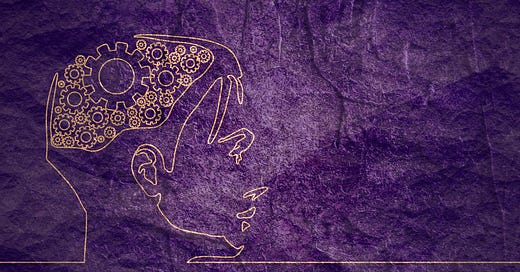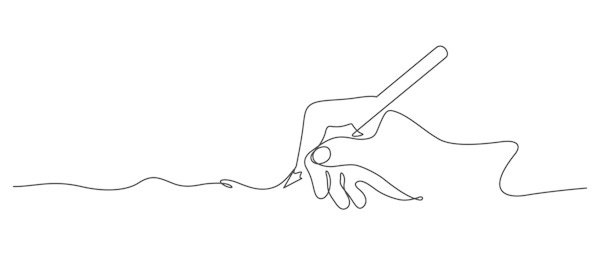Hi and welcome to another free post from ‘Something More’. I’m Caroline Ferguson, mindset trainer, speaker, therapist and your companion on this wander through mindset and self-leadership – with the odd slice of life thrown in. This is one of those.
I’ve published on Substack 76 weeks running.
Hurrah! That feels like quite an achievement for someone who used to be a chronic procrastinator. I’m also a fully paid up high-sensation-seeker, meaning I constantly need new, varied and intense experiences. This doesn’t exactly help when you’re trying to build consistent habits.
So what’s changed that’s made me able to show up here, every single week for 76 weeks in a row? And to run a 75-minute, live, monthly, mindset training session for paying subscribers for 17 straight months?
How have I managed not just to keep this up without getting bored, but to love doing it and continually strive to keep the quality and value as high as I can?
Because I’ve been taking my own mindset medicine.
In this article I’m going to share in Q & A style my story about the work I do and how I’ve managed to buck a lifeling trend and write the equivalent of two books’ worth of content without once thinking of giving up.
If I’ve missed an questions you’d like me to answer, please post them in the comments.
💜 What do I do for a living?
Various things, but principally I’m a cognitive behavioural hypnotherapist and mindset trainer who teaches others (and myself) how to think in healthy, flexible, self accepting ways.
💜 What is cognitive behavioural therapy (CBT)?
CBT is a proven form of talking therapy, based on the idea that our thoughts, feelings and actions are connected. If we can recognise and change unhelpful thought patterns, we can improve how we feel and how we respond to life’s challenges.
The version of CBT I studied is rational emotive behaviour therapy (REBT), which focuses particularly on identifying unhelpful beliefs, challenging them and replacing them with healthier, more realistic stories. When you combine REBT with hypnosis, it can work more quickly and the results can be deeper and stronger.
💜 What prompted me to retrain as a psychotherapist at an age when most people are thinking about slowing down?
I often mention the deep, yearning question I lived with for decades. The itch of knowing I was born for something different; something other than what I was doing. I knew there was something more out there that I was meant to do, or to be. But what?
All those feelings resolved the day I woke up on fire with the realisation that I had to go back to college, aged 50, to train as a psychotherapist. No-one was more surprised than me when this turned out to be my something more. You can read about it here.
💜 How did I become a mindset trainer if I initially trained as a psychotherapist?
For many therapy clients, there comes a tipping point after they’ve done the work of clearing the anxiety, trauma or other issue that took them to therapy in the first place. A point when creativity and aspiration kick back in, and they’re able to reclaim their optimism about the future.
I realised early on in my new career that that moment and what comes after it — the energy of renewal, hope and looking forward — puts me in my highest flow state.
A few therapy clients asked if I would continue working with them to help them build a new mindset, not just fix the old one. It was a wonderfully organic transition from pure therapy to what I do now.
💜 What is a mindset trainer, and how does that differ from a mindset coach?
The concept of mindset is so ubiquitous now that it seems odd to think that even a decade ago, it was still a relatively new thing.
Carol Dweck’s seminal book, “Mindset: The New Psychology of Success”, first published in 2006, introduced the idea of fixed and growth mindsets, but it took a while for those ideas to filter through to the coaching world. In 2013 I was in a few Facebook groups focused on business and personal development coaching and I seemed to be the only person specifically zoning in on mindset. Now there are mindset coaches everywhere you look.
I do use coaching (summarised as providing guidance, support and accountability through structured conversations) in my work but the reason I call myself a trainer, rather than a coach, is because I teach a process. I help sensitive, purposeful people overcome self-sabotage and learn to think in a more healthy, flexible, resilient way, using clearly defined steps and tools.
I strongly believe mindset training should be taught to every child from their earliest years. It gives us the power to regulate our thoughts, emotions and behaviour; boost our resilience; and know ourselves deeply.
💜 What makes me different to other mindset specialists?
There are plenty of good mindset coaches out there. What sets me apart is the focus on training, plus, unlike most coaches, almost everything I do has therapeutic roots.
I provide clients with the steps, tools and support they need to improve every area of their lives, not just the issue they walk in with. They can use my methods on any problem they want to fix or goal they want to reach.
I’m determined to provide a tangible return on my clients’ investment and faith in me. We always measure where they are at the start and do it again three months down the line. The average positive shift is 73%, and it keeps on improving from there.
Finally, I’m a massive champion of self-awareness, which I call the greatest life skill. In a nutshell, it’s about knowing ourselves deeply: our thoughts, beliefs, emotions, strengths, vulnerabilities, values, habits and biases. It’s also being able to objectively understand how the world really sees us.
I call it the most important life skill because if we aren’t aware of what we’re doing to ourselves, we can’t fix our issues. We need to develop that skill of hearing and noticing what’s going on for us.
💜 Tell us more about those steps and tools.
During my psychotherapy training I was thrilled at how effective the REBT process was at helping clients evict their unhealthy old beliefs and habits. Hypnosis made that process even more effective.
But, with my background as a communications professional and storyteller, I sometimes struggled with the language of therapy, which can be technical and academic. I’m definitely a ‘speak human’ person.
When I started gravitating more towards mindset training, I began adapting the REBT language and processes to make them easier to use and remember. I’m also highly curious about other therapies, coaching, and methodologies like NLP. I started integrating other proven methods, layering them into my REBT practice. Where I found gaps, I created tools and processes to fill them.
In time I built a suite of methods that my clients (and I) use to build self-awareness and reshape our mindsets. These include:
PACES - the 5 main ways in which we sabotage ourselves
The three most important questions that can help you transform any situation in just a couple of minutes
Some, like the four pillars of effective self-leadership, are not easy to convey in articles so I cover those in live mindset training sessions for paying subscribers.
💜 What happens when someone chooses to work with me one-on-one?
Making the decision to seek help is the single most important thing my clients do to bring about meaningful change in their lives. What they’re doing is giving themselves full permission to create a better reality for themselves. Many have invested in therapy and/or coaching in the past and are determined to shift the deeply-rooted beliefs and behaviours that have resisted their efforts so far.
We always begin with your story session. This is where you tell me your life history, from cradle (or even before that) to now. It usually takes at least a couple of hours.
Don’t underestimate the therapeutic value of telling your story to someone who’s interested, compassionate and knowledgeable. I learn so much about you from what you say, and how you say it, and even from what you don’t say. You’ll also find yourself joining dots you’ve previously missed and finding patterns you haven’t spotted before.
After your story session, there are three main parts to the work we can do together:
Healing the past — this step-by-step process involves digging out one of your most persistent limiting beliefs, together with the emotions and behaviours attached to it. Together we challenge the old story and I show you exactly how to transform it into a more helpful, flexible belief. You’ll come out of this stage with a huge leap in your level of self-awareness and the ability to tackle any other limiting belief.
Building the future — now you know how to stop sabotaging yourself, we focus on the future. What are your dream goals? What’s the ‘something more’ you were born to do and be? What new beliefs and habits will help you get there? Let’s put them in place, and boost your self-awareness another few rungs while we’re at it.
Become the master of your fate and captain of your soul — during this advanced mindset training, you’ll ramp up your self-awareness even further and build the core skills needed for true self-leadership. You’ll be able to reshape your mindset at will, weaken unwanted habits and install helpful new ones with ease. You’ll know what puts you in flow, use your values as your compass, and explore your ‘something more’ with purpose and conviction.
I’m still grateful every day that I get to help people overcome their limiting beliefs so they can live happier, healthier, more satisfying lives.
💜 After 13 years of following this path, am I ‘cured’ of all bad habits?
Definitely not — my glorious humanity comes with plenty of flaws 😄 I know building self-awareness will be a life-long adventure for me as I’m not one of the 10% of people naturally blessed with the skill.
But what has changed beyond measure is my ability to recognise when I’m getting in my own way, and to understand that I ALWAYS have a choice about how to think and behave. I aso have a powerful set of tools I can use to swiftly change my mental and emotional state when I feel challenged or on the verge of overwhelm. This knowledge has deepened my confidence and resilience.
Plus, as you can see, I’ve built a beautiful new habit of consistency 🥰🏆❤️🔥
The intention behind this growing body of articles on Something More, and the live mindset training sessions and recordings for paying subscribers, is to help you expand your self-awareness so you can move beyond your inner resistance and explore your something more.
I’d love to hear how you’ve developed your mindset and self-awareness skills – please feel free to share your experiences with us in the comments.
That’s all for this week. Thank you for reading and please do like and restack this article if you’ve found food for thought.
Until next time, sending love and take care,
PS - I’ve just posted a recording of our latest live mindset training session on how to challenge and change your self-talk. If you’d like to watch the recording, simply upgrade your membership for a month or a year to see some of my methods in action.










Fascinating, Caroline! I never knew a lot of this. I love this sentence, btw, to describe what you do: I help sensitive, purposeful people overcome self-sabotage and learn to think in a more healthy, flexible, resilient way, using clearly defined steps and tools.